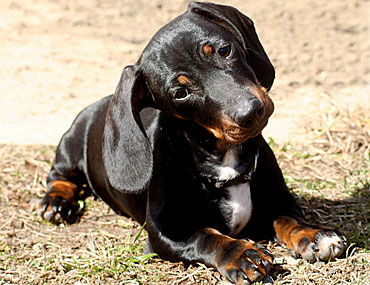Vet’s Views
Dr Kaushlendra Kumar
The doctor has been practising in Lucknow for the past 20 years in canine and other pet animal medicine and surgery
Q: My four-year-old Dachshund bitch keeps shaking her head vigorously as if there is something in her ears. However, I cannot see anything wrong. What should I do?
- Preeti K. Singh
This can be primarily due to earwax, an ear infection, or parasites in the body, especially in the ears. For wax, you need to get the ears cleaned with proper cleansers. If any bacterial or fungal infection is seen, a suitable antibiotic can be prescribed. For parasitic infestation, broad-spectrum dewormers are available that cover both external and internal parasites. This will take care of head shaking. Many times, dogs shake their heads when they feel cold, especially at night.
Q: My 36-month-old Lhasa apso is very prone to obesity. She goes on walks and is on a home-cooked, low-calorie diet. How else should I control her weight? - Niki Paul
There can be multiple reasons for your dog becoming obese. But as you said, you are keeping her on a low-calorie diet. So, this attracts attention. Low-calorie diets may not be balanced in nature. For diets, especially home-made, need to be balanced, which contain good quality proteins, a minimum of carbohydrates, little fat and fruits and vegetables to give sufficient multivitamins and minerals and also fibre. This balanced diet is essential to maintain a proper body weight. Exercise and walks keep your pet active and agile and help in delayed ageing.
Q: I have a Golden Retriever mix that develops a skin allergy every time the weather changes. The coat sheds, and the skin turns pink, itchy and smelly. Is there a cure? He is 6 years old. |- RP Singh
Your dog has a seasonal allergy and a hair shedding problem. In the majority of cases, this is taken as a normal issue because molting of hair is biannual and seasonal. But if it is frequent, then you need to check the immunity of the skin, which in turn depends on balanced nutrition, parasitic loads and general grooming care. If you see these factors one by one, you will be able to detect the cause and hence the treatment. Nutrition is one of the biggest culprits. However much fresh food you give, it may not be balanced, thereby exciting allergic reactions. These are seen due to weather changes, because temperature changes will cause the skin to react. Likewise, take care of parasites and hygiene.
Q: My 18-month-old Chihuahua has turned very moody. She has started snapping at us and picking fights with the other dog (a terrier) that we have. Can it be a health issue? Please advise. -Nimish Agarwal
A Chihuahua at her young age of 18 months is highly active and naughty in nature. This is totally a behavioural issue. You need to manage her by light exercise, a good, balanced diet and taking care of her reproductive health. As the animal enters adulthood, hormonal changes lead to mood swings, irritation and other behaviour issues. If you are not planning for breeding, get her sterilised at this age. This alone will control her nature and behaviour. Taking care of other major problems, deworming, vaccination, and grooming help a lot in managing these behavioural changes in the body.
Q: My Pomeranian juvenile dog has a bad breath problem. Is there a cure? - Vivek Kumar
Juvenile Pomeranians are not prone to bad breath or any dental issues. However, you need to see whether you are giving a soft diet, a proper amount of salt in the diet and chewable bones. Soft foods like milk, bread and sugar will invite bacterial infection and produce bad breath. Keep him on chewable diets. Something to chew. A minimum amount of salt in the diet is also essential. This will help him drink water. Water will clean the mouth, and urine and stools will be cleared properly. In general, regularly, you need to give a hard, fibrous diet to your pet.














Leave a comment